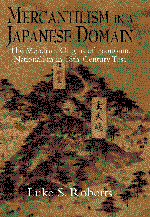Book contents
- Frontmatter
- Contents
- List of maps, tables, and figures
- Acknowledgments
- Dates and units of measurement used in the text
- Maps
- 1 Introduction
- 2 The geography and politics of seventeenth-century Tosa
- 3 Creating a crisis in Tosa, 1680–1787
- 4 The decline and restoration of domain finances
- 5 Voices of dissatisfaction and change: The petition box
- 6 Imagined economies: Merchants and samurai
- 7 Declining service
- 8 Cooking up a country: Sugar, eggs, and gunpowder, 1759–1868
- 9 Conclusion
- Glossary of terms and manuscript document titles used in the text
- Sources for figures and tables
- Works and documents cited
- Index
5 - Voices of dissatisfaction and change: The petition box
Published online by Cambridge University Press: 17 September 2009
- Frontmatter
- Contents
- List of maps, tables, and figures
- Acknowledgments
- Dates and units of measurement used in the text
- Maps
- 1 Introduction
- 2 The geography and politics of seventeenth-century Tosa
- 3 Creating a crisis in Tosa, 1680–1787
- 4 The decline and restoration of domain finances
- 5 Voices of dissatisfaction and change: The petition box
- 6 Imagined economies: Merchants and samurai
- 7 Declining service
- 8 Cooking up a country: Sugar, eggs, and gunpowder, 1759–1868
- 9 Conclusion
- Glossary of terms and manuscript document titles used in the text
- Sources for figures and tables
- Works and documents cited
- Index
Summary
Although I am of base birth and have never received your munificent bounty, I am nonetheless a man of this country. At a time when high and low will sink or swim together, I think it would be dishonest of me to hold back in my criticism. This is not a time to stop being angry. As long as my spirit holds out, I will set my fear aside and tell you what I think of your government.
Kihei of Kuma village, 1759The villager Kihei wrote a severe set of criticisms of domain government in a letter to the lord, Yamauchi Toyonobu, late in the year 1759: Officials were embezzling government funds and had not improved their ways since the call for reform made a few months earlier. Samurai children were vandalizing crops just for fun, and there was a general lack of respect and care for hyakushō that made many wish to leave their status. Village headmen and other local officials were not doing their jobs well. Corvée labor was undercompensated and mismanaged. People were blaming the immorality of government officials for recent weather disasters and the fire that destroyed Yōhōji, the temple devoted to the lord's ancestors. The domain needed to better educate its officials. The criticisms in this epistle go on and on. Numerous petitions surviving from this era show that Kihei was not alone in his criticisms.
People certainly had sound reasons to be dissatisfied with their rulers in the middle of the eighteenth century.
- Type
- Chapter
- Information
- Mercantilism in a Japanese DomainThe Merchant Origins of Economic Nationalism in 18th-Century Tosa, pp. 103 - 133Publisher: Cambridge University PressPrint publication year: 1998



